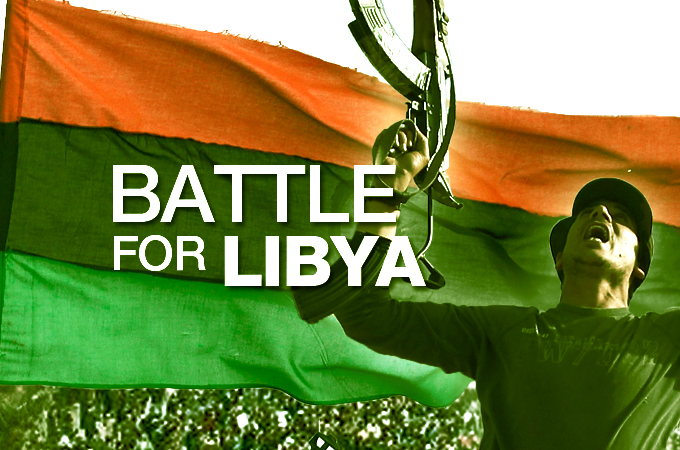Libyan rebels claim control over Ajdabiya
Anti-government fighters in strategic eastern town face attacks from Gaddafi’s forces as sandstorm halts Nato air raids.

Rebel fighters in Libya say they have captured Ajdabiya, but government forces are reported to be pounding the eastern town as battles rage on for control of the north African country’s coast.
The rebels, seeking to overthrow Muammar Gaddafi, Libya’s long-time ruler, had earlier advanced from Ajdabiya towards the nearby oil port town of Brega.
But they were outflanked by Gaddafi’s troops, who avoided the main body of fighting in order to attack from Ajdabiya’s south.
Al Jazeera’s Mike Hanna, reporting from just outside Ajdabiya on Sunday, said a sandstorm had prevented NATO aircraft from targeting government forces.
 |
| Keep up with all the latest developments here |
“Once you have weather conditions like this, it means that the Gaddafi’s forces are able to move on the highways, able to move very quickly,” he said.
“They are able to set up their artillery barrages more precisely, getting their spotters forward. This means they are much more effective in these conditions, because they do not have to worry about any air strikes from above.”
But the situation may be short-lived, he said.
“This may be temporary – this did also happen a week ago.”
Al Jazeera’s Sue Turton, reporting from the rebel stronghold city of Benghazi, said that control of Ajdabiya remains a strategic goal for pro-Gaddafi forces.
“If they take the town, they are able to prepare for an assault on Benghazi,” she said.
Fight for Brega
Control of Ajdabiya and Brega has changed hands between pro- and anti-Gaddafi forces numerous times since the uprising began in February.
 |
| Click here for more on our special coverage |
Following NATO air raids along the coastal road on Saturday, the rebel forces said they had reached the edges of Brega, bringing engineers with them to repair the damaged oil infrastructure.
But Gaddafi’s troops remain consolidated within the city centre, according to rebel fighters who returned to Ajdabiya in the evening.
“We have people on the edge of Brega, we control that area only,” Mohammed el-Misrati, 20, said.
“Nothing has changed inside Brega.”
The battle for territory in eastern Libya left eight anti-Gaddafi fighters dead and 16 wounded on Saturday.
“We were in our vehicles and they opened fire with rockets,”an injured fighter named Abdulrazek, in Ajdabiya hospital, said.
Misurata besieged
Fierce fighting has also been taking place in western Libya, for control of the country’s third-largest city, Misurata.
At least six people were killed there in artillery fire on Sunday morning, with some 47 more injured. In the previous day’s fighting, Misurata’s food industry facilities were reportedly damaged.
|
|
“They are trying to starve us to death, attacking the dairy, the water purification plant,” Jiraal, a Libyan who returned from Britain to join anti-Gaddafi fighters, told the AFP news agency.
Some 99 Misurata residents were transported out of the besieged city overnight by the aid agency Medecins Sans Frontieres (MSF), arriving in the southern Tunisian port of Zarzis.
The group comprised of people injured in shelling and street fighting.
It also included 64 people with serious injuries, and 10 patients in critical condition.
Also on Saturday, an International Committee of the Red Cross team arrived in Misurata on Saturday to assess the situation there.
This came nearly a week after Libyan officials reportedly said that opening an aid corridor to the city would constitute “an act of war”.
Cluster-bombs row
In a related development, Libyan officials have categorically denied claims that government forces used cluster bombs in the battle for Misurata.
The authorities rejected reports from Human Rights Watch, the New York-based watchdog, which said its researchers had found remains of cluster munitions in the city.
|
|
“Absolutely no. We can’t do this. Morally, legally, we can’t do this,” Mussa Ibrahim, the Libyan government’s spokesman, said.
“We never do it. We challenge them to prove it.”
Cluster bombs explode in the air, scattering small “bomblets” across a wide area. Many fail to detonate initially, leaving a potentially devastating minefield-like area on the ground.
Steve Goose, HRW’s arms division director, said: “It’s appalling that Libya is using this weapon, especially in a residential area.
“They pose a huge risk to civilians, both during attacks because of their indiscriminate nature – and afterwards because of the still-dangerous unexploded duds scattered about.”
Libya has never signed the Convention on Cluster Munitions, and is therefore not bound by the international treaty.
But Adrian Traylor, an independent conflict-resolution consultant, told Al Jazeera that the material gathered by researchers in Misurata “could be used as future evidence of a crime against humanity or war crime for, at very least, an attack directed at a civilian population – regardless of the cluster weapons convention”.